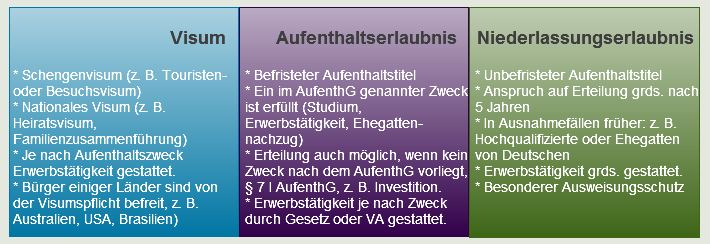Lüneburg Higher Administrative Court, decision of 30 November 2011, Ref.: 8 PA 186/11
§ Section 9 (2) regulates the general conditions for granting a settlement permit in Germany. According to § 9 Para. 2 No. 2 AufenthG, a settlement permit is only to be granted to a foreigner if their livelihood is secured.
According to the legal definition in § 2 Para. 3 Sentence 1 AufenthG, a foreigner's livelihood is secured if he or she can cover it, including adequate health insurance cover, without recourse to public funds.
In particular, the public funds listed in Section 2 (3) sentence 2 AufenthG are not taken into account. Thus, a positive prognosis is required that the foreigner's future livelihood is secured in the long term without recourse to other public funds.
This requires a comparison of the expected maintenance requirements with the expected available funds.
According to the case law of the Federal Administrative Court, since the amendment of the law on social and unemployment assistance on 1 January 2005, the determination of maintenance requirements and available income for foreigners in gainful employment is in principle based on the corresponding provisions of SGB II (see BVerwG, Urt. v. 16 November 2010 - 1 C 21.09 -, BVerwGE 138, 148, 153 f. with further references).
If a foreigner who is capable of earning applies for a residence permit to live together with family members in a domestic community or is already living together with his family, the rules on the community of need pursuant to § 9 para. 1 and 2 in conjunction with § 7 para. 3 SGB II apply in principle to the calculation of his entitlement to public benefits to secure his livelihood in accordance with SGB II. § 7 Para. 3 SGB II.
An isolated consideration of the need for assistance for each individual member of the family community is not possible. In the right of residence, securing the livelihood of employable foreigners therefore generally includes - and not only for special case constellations such as family reunification - the livelihood of the spouse living with them in a family community and unmarried children up to the age of 25 (see BVerwG, Urt. v. 16.11.2010 - 1 C 21.09 -, loc. cit., p. 154; judgement of 16 November 2010 - 1 C 20.09 -, BVerwGE 138, 135, 141; No. 2.3.2 f. and 9.2.1.2 General Administrative Regulation on the Residence Act - AVwV AufenthG - of 26 October 2009, GMBl. 2009, 877).
Facts of the Case:
The foreign plaintiff most recently received a gross monthly salary of EUR 546.28 and, according to the defendant's uncontradicted statements, was also dependent on monthly public benefits totalling approximately EUR 1,000.00 to secure his livelihood.
Plaintiff could not earn enough money due to severely disabled daughter and hip damage
As part of the procedure for granting a settlement permit, the applicant claimed, in accordance with the exception rule in Section 9 (2) sentence 1 no. 2 AufenthG, that he was unable to support himself independently due to caring for his severely disabled daughter. As an exception, he was therefore to be granted a settlement permit.
According to § 9 Para. 2 Sentence 6 in conjunction with. Sentence 3 AufenthG, the requirement for granting a residence permit under Section 9 (2) Sentence 1 No. 2 AufenthG is waived if the foreigner is unable to fulfil it due to a physical, mental or psychological illness or disability.
In addition, the claimant asserted that he was prevented from taking up full-time work due to a hip injury.
Judgement of the OVG Lüneburg
OVG Lüneburg sees complaint as unfounded
The OVG Lüneburg confirmed the view of the lower court that the physical, mental or psychological impairments must be present in the foreigner applying for the settlement permit himself and that the exception rule of Section 9 (2) sentence 6 in conjunction with sentence 3 AufenthG was not applicable to the case at hand.
An analogous application of § 9 para. 2 sentence 6 in conjunction with sentence 3 AufenthG is therefore also excluded from the outset. Sentence 3 AufenthG is therefore excluded from the outset in the present case (see BVerwG, Urt. v. 28.10.2008 - 1 C 34.07 -, NVwZ 2009, 246, 247; OVG Saarland, decision of 29.1.2008 - 2 D 472/07 -, juris para. 11; OVG North Rhine-Westphalia, decision of 19.10.2007 - 18 A 4032/06 -, juris para. 17; VGH Baden-Württemberg, judgement of 26 July 2007 - 13 S 1078/07 -, juris para. 24; GK-AufenthG, status: October 2011, § 9 para. 220 f.).
Certificates would not provide meaningful evidence of an inability to work full-time
Nor could it be concluded from the medical certificates submitted by the claimant that the foreigner was permanently prevented from working full-time.
The medical certificates only show functional restrictions on the applicant's ability to work, but not restrictions on working hours.
Consequently, the plaintiff's physical limitations did not prevent him from taking up full-time employment.
The medical certificates also do not state that the functional limitations associated with the illness would reach a degree of severity that would prevent the claimant from earning a living.
Source: Lüneburg Higher Administrative Court
Important Note: The content of this article has been prepared to the best of our knowledge and belief. However, due to the complexity and constant evolution of the subject matter, we must exclude liability and warranty. Important Notice: The content of this article has been created to the best of our knowledge and understanding. However, due to the complexity and constant changes in the subject matter, we must exclude any liability and warranty.
If you need legal advice, feel free to call us at 0221 – 80187670 or email us at info@mth-partner.de.
Lawyers in Cologne advise and represent you in immigration law



